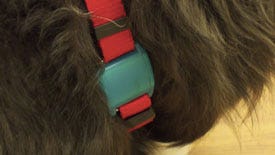Home Health Monitoring Is Going to the Dogs
October 15, 2013
|
A tracking system mounted to a dog's collar functions even when the collar shifts. Image from Ladha et al./Newcastle University. |
With their strong drive towards loyalty, dogs are highly responsive to an owner's emotional and physical health. For example, some dogs can be trained to detect the symptoms of uncontrolled diabetes and other ailments. If an individual falls or injures himself or herself near a family dog, the animal will often show signs of agitation.
Based on this behavior, researchers at Newcastle University have created a new dog-based medical monitoring system. First designed to track the welfare of animals, the system could also be used as a warning system for the health of a dog's owners. For example, the system could be used to monitor the health of elderly dog owners who may be averse to direct monitoring technologies.
The novel system used a 3-D accelerometer to record a dog's movement over four weeks. After analyzing motion data, researchers were able to categorize 17 different types of dog behavior with an accuracy rate of 70%. This includes running, walking, barking, and sniffing.
If a system like this is paired with a wireless remote monitor, an extended period of agitation or other abnormal behavior could signal that a dog's owner is experiencing health problems. However, researchers will need to gather a lot more behavior so that a detection system can tell the difference between a patient's broken hip and a squirrel outside the window.
About the Author(s)
You May Also Like



